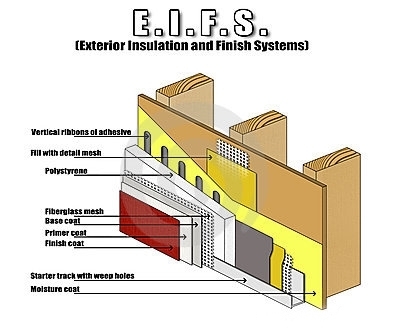One of the many services offered by Encorus Group’s Civil Materials Testing & Inspection Group is EIFS inspections. According to ASTM international, EIFS, or Exterior Insulation and Finish Systems, are an exterior wall system that consist of an insulation board attached to the substrate, a base coat, and a protective top coat. These systems offer constant insulation, and allow architects to design buildings without the added concern of choosing materials for insulation purposes.
EIFS were originally only used on commercial buildings, but have found their way into residential buildings as well. According to the EIFS Industry Members Association (EIMA), EIFS generally consist of:
• A water-resistive barrier (WRB) that covers the substrate
• A drainage plane between the WRB and the insulation board that is most commonly achieved with vertical ribbons of adhesive applied over the WRB
• Insulation board typically made of expanded polystyrene (EPS) which is secured with an adhesive or mechanically to the substrate
• Glass-fiber reinforcing mesh embedded in the base coat
• A water-resistant base coat that is applied on top of the insulation to serve as a weather barrier
• A finish coat that typically uses colorfast and crack-resistant acrylic co-polymer technology
EIFS claddings are becoming increasingly popular due to their energy savings and reduced environmental impact. EIFS can reduce air infiltration by up to 55% compared to wood or brick cladding. In addition to this, EIFSs are durable, aesthetically flexible, and are fire resistant.
Most EIFS do not have drainage systems, therefore if the moisture level becomes high enough, the substrate is subject to rotting, leading to the failure of the EIFS. According to the American Society of Home Inspectors (ASHI), there are several things to look for when examining an EIFS for moisture damage. Things noted by the ASHI to observe visually include, dark streaks at the bottom corner of the windows and where the ends of the gutters meet, obvious signs of physical damage such as dings or holes, and exposed mesh, the EIFS touching the roof shingles, and wrinkles in the EIFS. Another thing to observe is the condition of the caulk around the windows. If the condition is poor or non-existent, it is highly likely that there will be moisture damage to the EIFS. If the EIFS gives way and feels squishy, it may be loose or there may be a moisture build-up.
It is important to identify any issues with an EIFS, as it can save money and time in the construction process. If your construction site has EIFS that require inspection, contact Jeremy Lake at (716) 592-3980 ext. 133, or [email protected].


